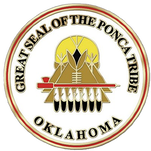Ponca Tribe of Indians of Oklahoma
EMERGENCY MANAGEMENT DEPARTMENT
The Ponca Tribe Emergency Management Department prepares for, responds to, recovers from and mitigates against disasters and emergencies. The department maintains, regularly updates, and exercises the Emergency Operations Plan in accordance with local, state, and federal regulations.
History of the Department:
The Emergency Management Department was established in 2020 through an ANA Social Economic Development Strategies Grant in order to build and sustain capabilities across the whole Ponca Tribal Community. The department is structured to reflect the 4 phases of emergency management to include: Preparedness, Response, Recovery, and Mitigation and allow delivery of services through local emergency managers in Region 6 for the Ponca Tribal Community.
The program currently provides the following items to community members:
-Face Masks/Face shields
-Alcohol based Antiseptic/Sanitizer
-Bleach base/Disinfectant cleaning solution
-Gloves
-Weather radios
Community Preparedness:
For more effective response to a disaster, the Emergency Management Department helps plan, promote, and conduct local, state, and federal exercises to test response capability. The department also offers numerous training courses to Ponca Tribal community members throughout the year.
Emergency Response:
During emergencies, the Emergency Management department coordinates emergency operations including:
-Monitoring potentially severe events
-Evaluating the possibility for securing state & federal disaster assistance
-Managing state and local resources
-Providing emergency public information
-Developing & distributing situation reports
-Conducting preliminary damage assessments
Disaster recovery:
Following a local, state, or federal emergency or disaster declaration, the Emergency Management Department is responsible for providing quick & efficient delivery of state & federal aid to those affected by the event(s).
Hazard Mitigation:
The mitigation resources are available to local communities across the state to assist with identifying & implementing long-term hazard mitigation measures before, during, and after major disaster declarations. The emergency management department works closely with local, state, and federal representatives to develop an ongoing program to identify hazards and decide the best wat to reduce or eliminate them.
For more information:
Thomas Pappan III - Emergency Manager
[email protected]
History of the Department:
The Emergency Management Department was established in 2020 through an ANA Social Economic Development Strategies Grant in order to build and sustain capabilities across the whole Ponca Tribal Community. The department is structured to reflect the 4 phases of emergency management to include: Preparedness, Response, Recovery, and Mitigation and allow delivery of services through local emergency managers in Region 6 for the Ponca Tribal Community.
The program currently provides the following items to community members:
-Face Masks/Face shields
-Alcohol based Antiseptic/Sanitizer
-Bleach base/Disinfectant cleaning solution
-Gloves
-Weather radios
Community Preparedness:
For more effective response to a disaster, the Emergency Management Department helps plan, promote, and conduct local, state, and federal exercises to test response capability. The department also offers numerous training courses to Ponca Tribal community members throughout the year.
Emergency Response:
During emergencies, the Emergency Management department coordinates emergency operations including:
-Monitoring potentially severe events
-Evaluating the possibility for securing state & federal disaster assistance
-Managing state and local resources
-Providing emergency public information
-Developing & distributing situation reports
-Conducting preliminary damage assessments
Disaster recovery:
Following a local, state, or federal emergency or disaster declaration, the Emergency Management Department is responsible for providing quick & efficient delivery of state & federal aid to those affected by the event(s).
Hazard Mitigation:
The mitigation resources are available to local communities across the state to assist with identifying & implementing long-term hazard mitigation measures before, during, and after major disaster declarations. The emergency management department works closely with local, state, and federal representatives to develop an ongoing program to identify hazards and decide the best wat to reduce or eliminate them.
For more information:
Thomas Pappan III - Emergency Manager
[email protected]
